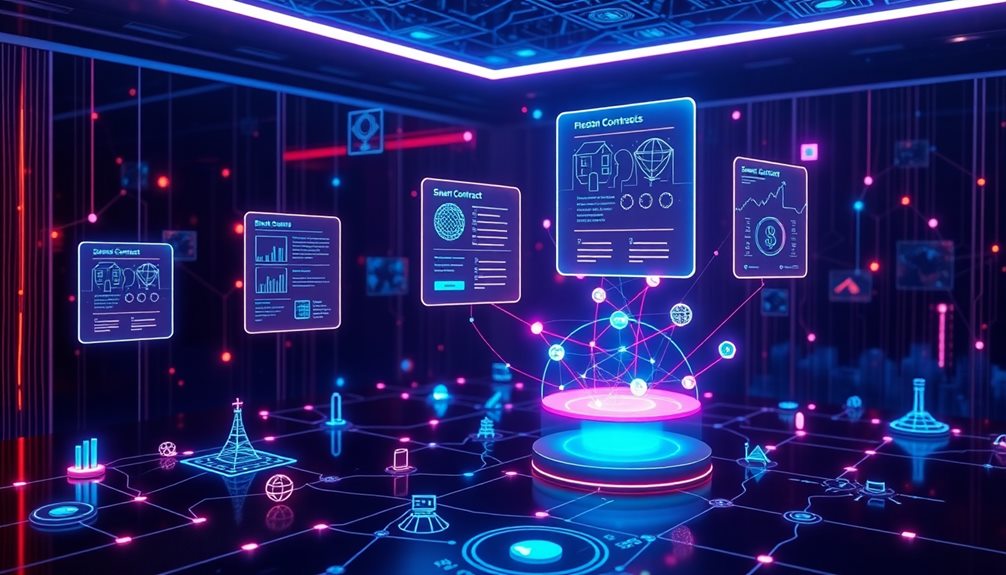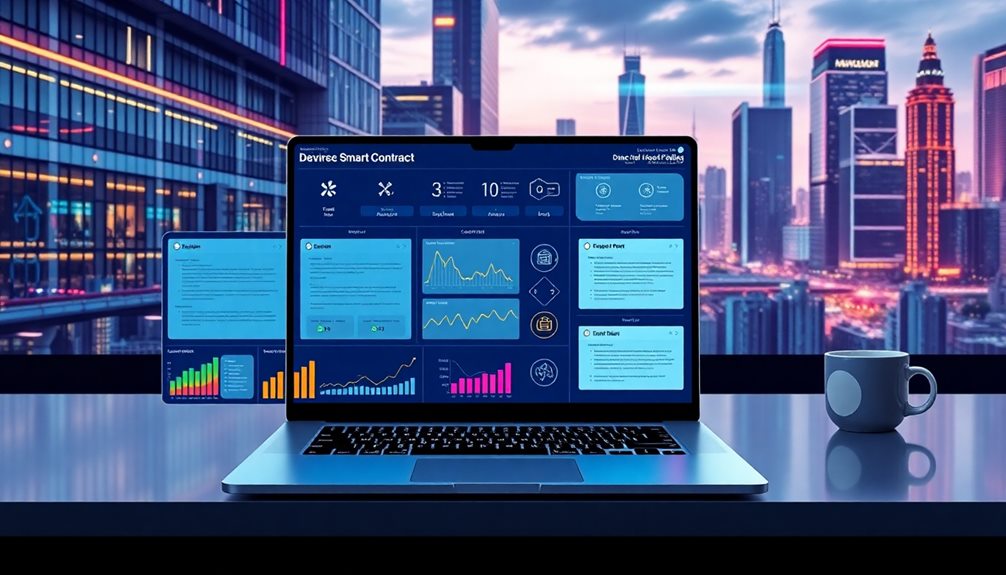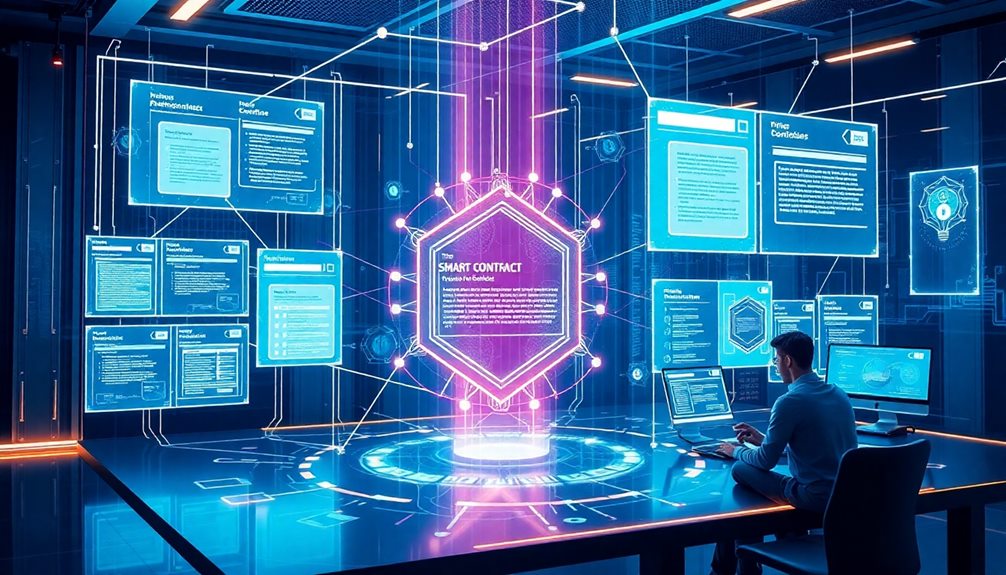Blockchain smart contract templates streamline your business operations and save you money. They provide ready-made solutions tailored for various industries, like finance and real estate. With customizable components, you can save time and reduce development costs considerably. Tools like Alchemy and OpenZeppelin enhance your contract creation experience by ensuring security and efficiency. Templates such as NFT smart contracts and Uniswap v3 Core facilitate unique digital asset management and efficient trading. As the landscape evolves, embracing these innovations can position your business at the forefront of technology, and there's much more to explore on how these tools can benefit you.
Key Takeaways
- Smart contract templates streamline development, significantly reducing time and costs for startups and small businesses in various industries.
- Key templates like Uniswap v3 and NFT contracts cater to specific business needs, enhancing functionality and reliability.
- Low-code/no-code platforms increase accessibility, allowing non-technical users to deploy smart contracts with minimal coding experience.
- Tools like Alchemy and OpenZeppelin provide essential resources and secure templates, aiding developers in creating reliable applications.
- Industry applications, including trade finance and real estate, can benefit from automated processes and improved efficiency through smart contracts.
Overview of Smart Contract Templates

Smart contract templates simplify the process of developing blockchain projects by offering ready-made solutions tailored to various industries. You'll find that these templates streamline smart contract development, making it easier for you to implement blockchain technology in your business.
With customizable components, you can adapt the templates to meet your specific needs, whether you're in financial services, real estate, or gaming. Additionally, the integration of AI-driven solutions can further enhance the capabilities of smart contracts, providing you with more intelligent and efficient processes.
One of the biggest advantages is their ability to greatly reduce development time and costs. If you're a startup or small business, this means you can focus your resources elsewhere while still deploying effective blockchain solutions.
Popular categories, such as financial services for DeFi platforms and property management for real estate, highlight the versatility of smart contract templates.
Moreover, the rise of low-code/no-code platforms is enhancing accessibility, allowing even those without extensive technical expertise to leverage these tools. This trend fosters broader adoption of blockchain solutions across various sectors, making it easier for you to stay competitive in a rapidly evolving market.
Embracing smart contract templates can't only simplify your development process but also position your business for future success.
Key Templates for Businesses

When you're exploring blockchain solutions for your business, key smart contract templates can make a significant difference in your development process.
These templates not only streamline your operations but also enhance your project's efficiency. Understanding the legal implications of using blockchain technology is essential, especially in areas such as copyright vs. trademark differences which can impact how you protect your innovations.
Here are some prominent options to take into account:
- Gnosis V2: An archive of smart contracts that facilitates developer review and integration.
- Boring Solidity: Provides general-purpose Solidity contracts and libraries, ideal for businesses seeking reliable contracts.
- Uniswap v3 Core: The central template for DeFi platforms, vital for enabling efficient trading functionalities.
- NFT Smart Contract Templates: Tailored specifically for creating and managing unique digital assets in the NFT space.
- CantBeEvil License: A reference managed by A16z, guaranteeing ethical compliance and operational integrity in your smart contract implementations.
These templates cover a range of applications, from DeFi to NFTs, allowing you to leverage existing frameworks while maintaining a focus on your business goals.
Development Tools and Resources

Steering through the blockchain landscape requires effective development tools and resources that can greatly enhance your project's success. As you immerse yourself in creating Vyper smart contracts or exploring Solidity programming, leveraging robust developer products and tools will help you achieve your goals efficiently.
Consider these essential tools:
| Tool/Resource | Description | Benefits |
|---|---|---|
| Alchemy | APIs and transaction simulation features | Streamlines smart contract development and testing |
| OpenZeppelin | Library of secure smart contract templates | Easier to build reliable applications |
| Solady | Optimizes Solidity code for gas efficiency | Reduces costs for deploying contracts |
| Cookbook | Search engine for EVM smart contracts | Enhances accessibility to open-source projects |
Utilizing these resources guarantees you have access to a repository of smart contracts and can focus on implementing features like on-chain voting. Furthermore, don't overlook the importance of security—services like Solidity Finance specialize in auditing to maintain trust in your blockchain applications. With the right tools, you're set for success in your smart contract journey.
Industry Applications and Benefits

Blockchain technology has revolutionized various industries by enabling automation and efficiency through the use of smart contract templates. These templates streamline processes, reduce costs, and enhance security across multiple sectors, similar to how RMD strategies help minimize tax impact in retirement planning.
Here's how they're making a difference:
- Trade Finance: Save $15-$20 billion annually with automated payments tied to specific conditions.
- Real Estate: Streamline property transactions and lease agreements to reduce fraud and guarantee timely payments, boosting operational efficiency.
- Healthcare: Automate patient data sharing and billing, potentially cutting down administrative costs that account for 15-20% of U.S. healthcare spending.
- Insurance: Automate claims processing and underwriting, leading to potential annual savings of up to $10 billion by minimizing manual interventions.
- Intellectual Property: Protect intellectual property rights by assuring timely compensation for creators in the music industry through transparent and secure licensing agreements.
With these applications, smart contracts not only facilitate dispute resolution but also pave the way for a more efficient and transparent future in various industries.
Future Trends and Challenges

The landscape of smart contracts is rapidly evolving, presenting both exciting opportunities and formidable challenges. As the adoption of low-code and no-code platforms rises, you'll find it easier to develop and deploy Solidity smart contracts, even if you lack technical skills. Enhanced interoperability between blockchain networks will streamline your deployment process, enabling cross-chain functionalities and broader integration of decentralized applications (dApps).
However, as decentralized finance (DeFi) and non-fungible tokens (NFTs) gain traction, smart contract templates must address compliance issues and other challenges. You'll need to prioritize security measures, as logic hacks and data integrity concerns remain significant risks.
The growing focus on sustainability will also drive the demand for energy-efficient blockchain solutions, pushing you toward smart contract templates that minimize environmental impact.
As you navigate these trends, staying informed about the evolving landscape is vital. Embracing these innovations while addressing the inherent challenges will position you for success in harnessing the full potential of smart contracts. Balancing innovation with robust security and compliance will be key to ensuring a sustainable future in this dynamic sector.
Frequently Asked Questions
How Do You Write a Smart Contract for Blockchain?
To write a smart contract for blockchain, you'll need to choose a programming language like Solidity. Structure your code with essential components, test it thoroughly, and guarantee it's secure before deploying it to the blockchain.
What Are Smart Contract Templates?
Smart contract templates are like magic blueprints; they simplify your coding journey, offering ready-made structures. You can customize them easily, saving time and money while ensuring you're following industry standards effortlessly. They're game-changers!
What Is the Most Popular Blockchain for Smart Contracts?
The most popular blockchain for smart contracts is Ethereum. You'll find it hosts thousands of decentralized applications and DeFi protocols, making it a go-to choice for developers looking to create innovative solutions in this space.
What Is an Example of a NFT Smart Contract?
Imagine you create digital art; an example of an NFT smart contract is ERC-721. It allows your artwork to be uniquely owned and traded, ensuring its authenticity and enabling you to earn royalties on resales.
Conclusion
Incorporating smart contract templates into your business can revolutionize your operations, making them as effortless as a breeze on a summer day. With the right tools and industry knowledge, you can streamline processes, reduce costs, and enhance security like never before. As you embrace this innovative technology, you'll not only stay ahead of the curve but potentially transform your entire industry. The future's bright for those who seize these opportunities—don't miss out on your chance to lead the charge!









